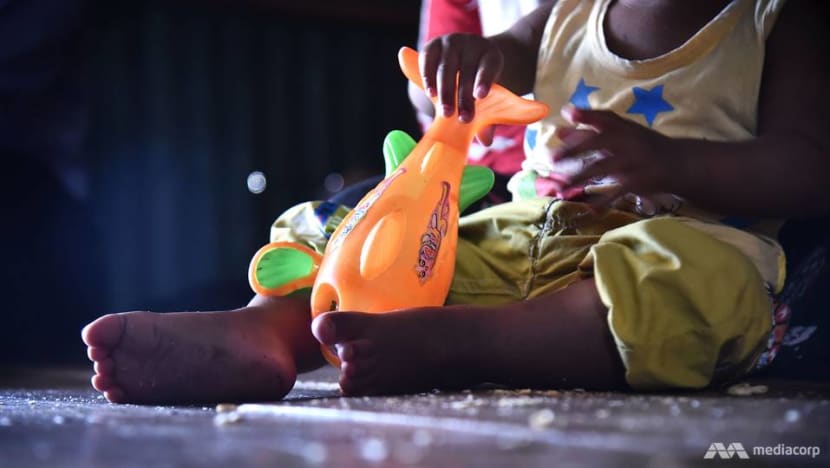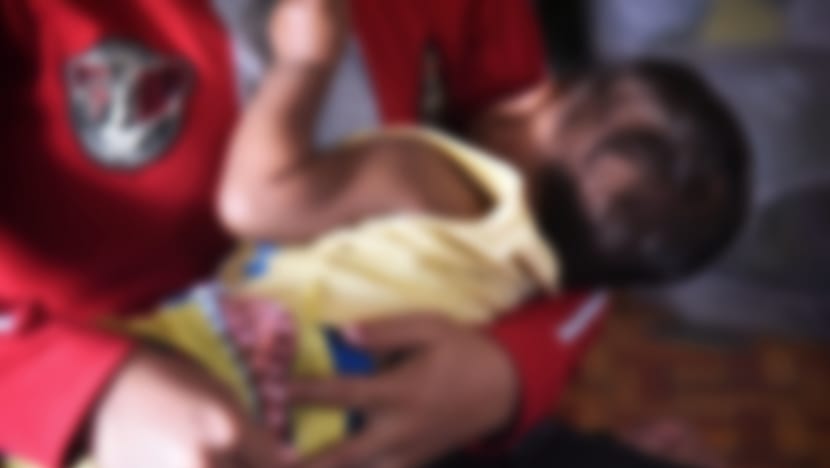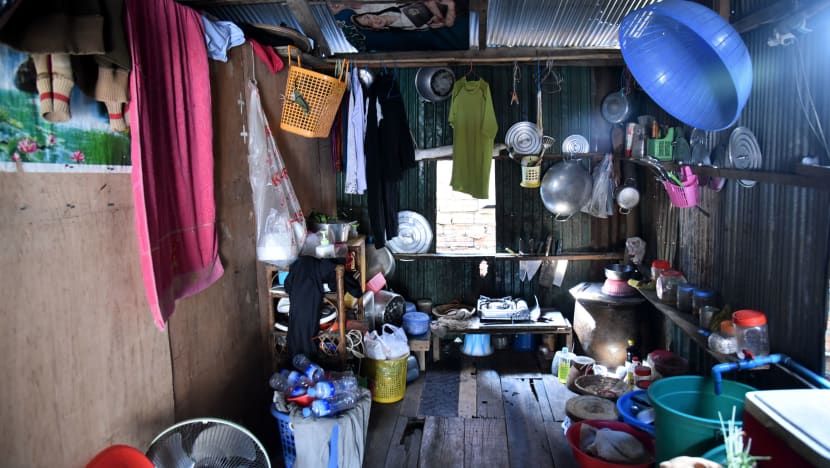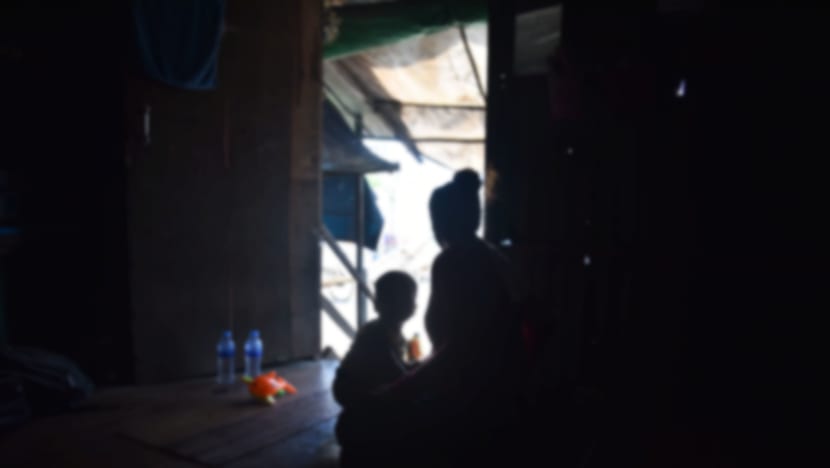In prison, Cambodian babies grow in squalid conditions as war on drugs rages
Since the Cambodian government started a war on drugs in 2017, the number of prisoners has considerably increased. Among them are pregnant women who have no choice but to give birth and raise their babies behind bars.

Chanlina's son plays with his toy at home after his mother was released from prison in November 2018. (Photo: Jack Board)
PHNOM PENH: Chanlina was seven months pregnant when she was jailed. For nearly ten months, the mother-to-be was held without trial, for an alleged drug-related offence, at the Correctional Centre 2 (CC2) of Prey Sar, Cambodia’s largest and most notorious prison.
Chanlina, whose real name has been changed to protect her identity, was placed in an overcrowded cell shared by 20 female inmates. She ate twice a day – breakfast at 9 am and dinner at 2 pm – mostly rice and soup. There was no fan. The air was hot and stuffy.
“We lay tightly together when we slept and I would only have enough food when my mother-in-law came to visit,” said Chanlina, now 29.
“I was in pain before going into labour but unless the pain was unbearable, they wouldn’t send me to the hospital. They kept me in jail and waited until I was close to giving birth.”

Before her release in November, her son was among some 130 children confined with their mothers in prisons nationwide, based on data collected by human rights group Licadho – a non-governmental organisation that has provided legal, social and medical support to prisoners across Cambodia since 1993.
Its report released in October last year showed the numbers of infants living behind bars with their mothers have increased since the government began a war on illicit drugs in 2017. The organisation had recorded 30 children under the age of three in 18 prisons it monitors by the end of 2015 before the number hit an all-time high of 179 in 2017.
“Before the anti-drug campaign, the numbers of infants in prisons were mostly between 30 and 50. In July last year, there were 138 infants living with 135 mothers and 29 pregnant women,” said Licadho’s monitoring manager Am Sam Ath.
The number could be higher if we included other prisons we don’t work with.
The increase in the prison population has put pressure on the General Department of Prisons, which operates a total of 28 prisons in Cambodia.
One of the biggest problems is overcrowding. In October last year, Licadho reported 6,711 inmates were held in Phnom Penh’s main male prison – the Correction Centre 1 – while the facility is designed to house only 2,050 inmates.
However, according to Martina Cannetta from Il Nodo Cambodia – a non-governmental organisation that has provided support to detained mothers and infants behind bars since 2010 – the government has made “huge efforts” to improve the living conditions for inmates.
“The government is trying but it’s a long process with a lot of difficulties,” she said, adding the implementation is not without challenges as long as more people are being sent to jail.
YOUNG LIFE BEHIND BARS
For Chanlina, life in prison was harsh and especially so for her baby. The mother and son enjoyed only three days outside the crowded cell of CC2 when she gave birth at the Cambodian-Japanese Hospital.
At that time, Chanlina was yet to be convicted and had no idea her son would have to spend the first 15 months of his life in squalid conditions behind bars with her. After nearly ten months of pre-trial detention, the mother of one was sentenced to 18 months behind bars for drug dealing.
“I pitied my baby, who had to be imprisoned with me. He was always ill and suffered a skin disease. The prison was small and full of children. When one got ill, the disease would spread to others too,” she said.
My baby didn’t see any car or motorcycle during when we were in jail. He saw nothing but inmates. He didn’t speak or play, only cried.
Cambodian law allows infants to stay with their mothers in prison until they turn three. Afterwards, if they have no relatives to look after them, these children will be placed under the care of other organisations sourced by the government.
The rising number of babies in detention facilities has raised concern among rights groups about food and health support from the government, which has long been limited. According to Cannetta, mothers and babies have access to health posts in prisons but the facilities do not have paediatric medicines.

During her imprisonment, Chanlina said inmates and their children were either prescribed pain killers or antibiotics when they felt unwell. “There weren’t so many medicines,” she added. “Even children got the same prescription. There was only paracetamol and amoxicillin.”
Child healthcare remains one of the major challenges for prison directors, who are only allocated limited funds for the fast growing prison population. Each inmate is provided with US$0.88 worth of food per day, according to Be Tea Leng, director of the operation department from the Interior Ministry's General Department of Prisons. As a result, detainees mostly rely on food and support brought to them from outside by their relatives and NGOs.
“It may not be sufficient but if we compare the amount with what our officers get – 4,000 riels (US$1) per day – I believe that’s appropriate,” he told Channel NewsAsia.
A 4x6m room, he added, usually holds no more than 30 inmates. Shelves are installed to create more space. For mothers and babies, however, Be Tea Leng said they are separated from other detainees and receive more attention from prison officers.
It’s better than those without babies.
PRE-TRIAL DETENTION AND BAIL
In its recent report, human rights groups Licadho said the “appalling” conditions of Cambodian prisons are results of “a dire lack of funds, severe overcrowding” and “disproportionate and unjust sentencing”.
The NGO, which monitors nearly 30,000 inmates in 18 prisons nationwide, blamed what it described as “the overuse of pre-trial detention” for the increase of pregnant inmates and mothers with young children behind bars.
“The court has put too many people in pre-trial detention without considering granting bail to those involved in misdemeanours. More women have been arrested for drug-related charges and the number of babies born in detention has also increased,” said Am Sam Ath from Licadho – the Cambodian League for the Promotion and Defence of Human Rights.

The numbers of infants in detention rose from 30 at the end of 2015 to 138 in July 2018, alongside 135 mothers and 30 pregnant women, according to Licadho’s report. Almost half of 80 new and expectant mothers were being held in pre-trial detention, the report added.
Cambodian law allows pre-trial detention of up to 18 months for anyone involved in a felony. However, defendants can be legally held for an additional four months while waiting for trial. For innocent people, it is a long period of time behind bars.
“Defendants should be presumed innocent as long as they aren’t sentenced by the court,” Am Sam Ath said.
If they really committed a crime, pre-trial detention would be OK. But if the court can’t find them guilty, who will be responsible for that?
In response to the rights group’s protest against pre-trial detention, Justice Ministry spokesman Chin Malin said the practice only comes as “the last choice” when the accused does not qualify for bail.
“They may escape or destroy evidence and witnesses, for instance. Granting them bail could also affect their own safety or the public order,” he told Channel NewsAsia.
“And because babies can’t live without their mothers, we let them stay together in prisons.”
PRISON BREAK
Growing up in an overcrowded prison could be harmful for young children. But at CC2, those aged 18 months and above have an option to leave the compound to go to a daycare centre run by Il Nodo Cambodia, while younger ones have their health checked on a daily basis. Mothers are provided with extra food and attention.
At the daycare centre’s playroom, children participate in various activities designed to improve their development. Cannetta said the facility has great impact on the children’s life quality as it allows them to be children, playing with their friends and exploring the environment.

“When I first entered the prisons, babies were kept in small hammocks all day because they couldn’t explore the environment. They weren’t encouraged to start walking or speaking. So children aged four to five still couldn’t walk or speak,” she said.
“When babies need to grow up in a cell with 50 people, you wouldn’t want them to start walking, crawling, talking or screaming too much because that will affect other people, who will start complaining.”
Without the playroom, Cannetta said children in prisons develop much more slowly as they are not encouraged to grow and are unable to witness what normal life is like.
A child in prison only witness cells, people who sit there all day and don’t do anything, the guards and probably violence.
Back at home, Chanlina played with her son, enjoying the freedom she had been deprived of for 18 months. Her future now revolves around the little boy in her lap.
“I will never commit that crime ever again because I suffered so much in prison. Life was extremely hard and I’ll never let that happen for the second time.”












